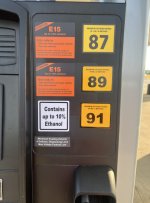Dora~Jean":1bv5jux9 said:
Maybe someone more knowledgeable than I can weigh in on the particulars of damage to marine engines caused by Ethanol. My understanding is that it primarily affects carbureted engines because the gas (w/Ethanol) can erode the aluminum surfaces of the carb(s) while sitting in the fuel bowl for long periods of time. This eroded aluminum can then find its way into the jets and orifices of the carb(s) and affect operation like running lean, etc. EFI motors are way less affected, if at all. Like also, automobiles.
My twin Yamaha 80’s have 4 carbs each, and so far I haven’t noticed any operational problems in the 20 years of ownership, and I’ve been less than perfect seeking out non-ethanol gasoline. Lucky?
There are four things that can cause trouble for some engines (E10 fuel).
1. Some materials are incompatible with ethanol. Ethanol can cause hoses and such to deteriorate. This can gum up and an engine when the debris from the hoses gets in fine things like carburetors. Engines manufactured in the last 25 or so years will not have any parts that are affected by ethanol.
2. Ethanol is a solvent. If you haven't used it before, it will clean out your engine and hoses. The stuff it cleans out gets in the engine and can cause problems. Once cleaned, you should have any more problems. If you regularly use ethanol fuel, your engine will be cleaner than those that don't.
3. Ethanol is hydrophilic. This means it can have water in the fuel. People freak out about this. However, the amount of water that ethanol fuel can entrain is a pretty small percentage (0.41%). This does not affect the engine operation. In addition, since ethanol fuel can carry this water, it gets burned out of the tank by the engine and the water does not accumulate in the tank.
4. Phase separation. This is the real problem. The water and ethanol separate from the gasoline. When phase separation occurs, the ethanol fuel pretty much is unusable. If you try to run an engine with phase separated fuel, you are pretty much pumping water though it (water is at the bottom of the tank where the pickup is). However, phase separation does not occur on a regular basis. You need the right conditions and the fuel needs to sit for a long time while vented to the atmosphere (to absorb water). IME, using the fuel in 6-9 months you should not experience phase separation.
I run my boat with fuel I get at an auto gas station on the way to the ramp. It may get E0 fuel if I get fuel from a fuel dock, but I don't go out of my way for E0 fuel. My boat sits over the winter with whatever fuel is left in the tanks with the appropriate amount of Stabil. It still runs fine in the spring on the previous season's remaining gas.

